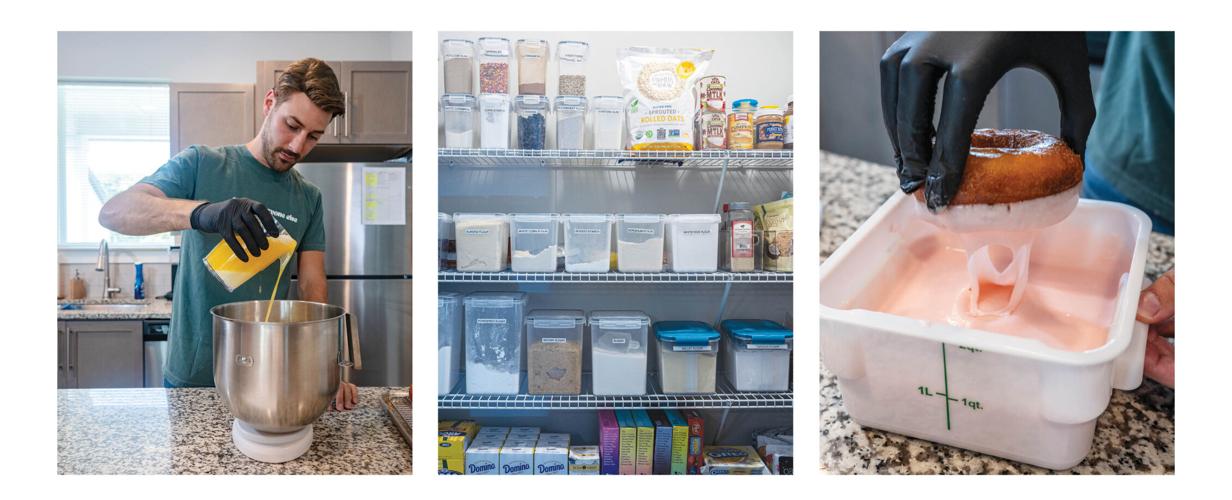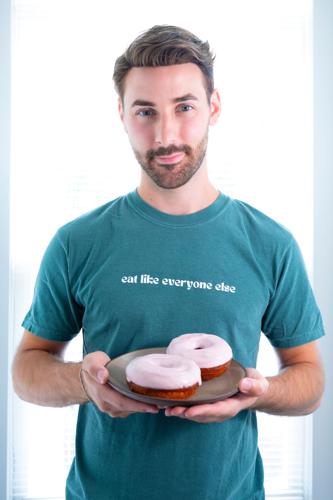
Michael Werrell
The culinary world judges pastries, bread and noodles on their stretch and bounce. The perfect hand-pulled noodle feels pliant, like it could survive a few bite marks and spring back into shape. Celebrated sourdough hides spongy crumb that can both hold a layer of ricotta and soak up olive oil. Croissants puff like they’re inflated.
Pastry chef Michael Werrell’s body turning against gluten — the structural protein that enables elasticity in wheat-based foods — was the universe’s sick joke. Starting out at a local Italian dessert spot in New Jersey, Werrell made his way into Michelin-studded Manhattan with stints at Eleven Madison Park, Betony and Dominique Ansel Bakery (of Cronut fame). During COVID-19 lockdown in 2020, he moved from New York to Nashville for a job in the Sean Brock restaurant family.
Werrell says that when he finally caught the virus, it changed his immune response to gluten. The basic building block of his career became off-limits.
“I could make cakes, pâte à choux and croissants, but I couldn’t eat them,” Werrell tells the Scene at his apartment complex near McFerrin Park. “That was a huge hardship for my career. But instead of taking it as a downfall, I saw it as a challenge to see how far I could manipulate starches and flours to create the food I know.”
With the precision of a scientist, Werrell explains that gluten is actually two proteins: gliadin and glutenin. Together they create the gluten network that traps air and helps dough rise. Replacing this aspect of flour often baffles hopeful bakers seeking a gluten-free substitute.
“Things like brownies, cupcakes and muffins don’t have a high gluten content, so they’re easier,” explains Werrell. “That’s why you can go to the store and find substitutes. It’s the baguettes, noodles and croissants that pose more of a struggle. It’s the processes, the combination of flours, that I would call trade secrets.”

Werrell launched Glootn, a gluten-free pop-up bakery, last summer. He started with bagels, another baked good rarely available without gluten. He has since tackled other baking prizes that often elude the gluten-free community. With diligent note-taking, Werrell perfects each recipe over multiple attempts from his home kitchen. His mixes draw from a pantry stocked with neatly labeled ingredients: almond flour, potato starch, tapioca flour, xanthan gum, psyllium husk, white cornmeal and dozens more. He keeps his home entirely gluten-free, a high standard that makes his goods safe for even highly sensitive consumers, many of whom identify as having celiac disease, the official diagnosis for a gluten-intolerant digestive system.
Glootn has pushed his home kitchen beyond capacity (usually between 16 and 18 dozen units). After weeks of experimenting and days of prep, Werrell wakes up at 2 a.m. to tackle trays of goods that he sells hours later at farmers markets and special events. The day we talk, he’s prepping a doughnut sale at Porter Flea. Werrell built all 12 flavors on a brioche base with flavor profiles reminiscent of nostalgic snacks of the late 1990s and 2000s, like Dunkaroos and Zebra Cakes. As at his first four pop-ups, which featured menus stuffed with specialty croissants and cinnamon rolls, the doughnuts sell like crazy. He typically sells out in less than an hour thanks to lines that stretch 30, 40 or even 50 people deep. The gratitude and loyalty of his customers make an impression.
“When you are gluten-free, you get told no a lot,” Werrell says. “I think it’s a special moment when you finally get told, ‘This is safe, you’re not going to get sick.’”
Nashville’s gluten-free offerings have quickly expanded to accommodate a growing consumer base. Other bakers have filled similar needs, often offering services via social media, pop-ups or custom ordering. Morsel — a GF and vegan bakery — delivers to many local coffee shops. Baked on Branch, which offered GF sourdough and starter cultures, recently announced it will cease baking on June 28. High demand had apparently pushed business too big too quickly.
“We’ve reached a point in our business that in order to find sustainable baking rhythms, we either need to expand by investing in equipment to meet our demand, or pull back from baking at this scale,” reads a statement on Baked on Branch’s Instagram account, in part.
The shift from social media side hustle to brick-and-mortar bakery is daunting. Werrell, who has struggled to find a safe GF commercial kitchen, aspires to open a storefront but has too much restaurant experience to attempt such a risky jump prematurely. After the Wild Muffin suspended operations in 2022, and The Dotted Lime — a beloved Columbia restaurant and bakery that earned many fans in Nashville — closed in the fall, only The Gluten Free Goose near Lenox Village remains as Middle Tennessee’s dedicated gluten-free outpost.
Meanwhile, customers are waiting, swapping tips about the best places to go for good food and clearly labeled menus.
“Typically, I do my research in advance and look up menus to see my options,” Kara Tusch tells the Scene at Headquarters Coffee over a gluten-free madeleine from Morsel. She was diagnosed with celiac disease six years ago. “We know the places we like and can go safely. I’ve learned to carry my own snacks. Finding a place that’s all gluten-free, it’s like heaven. You can blindly pick anything and don’t have to worry.”



